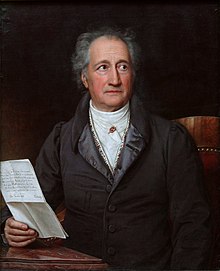Johann Wolfgang von Goethe
Johann Wolfgang von Goethe (* 28. awgusta 1749 w Frankobrodźe nad Mohanom jako Johann Wolfgang Goethe; † 22. měrca 1832 we Weimarje) bě jedyn z najwuznamnišich reprezentantow němskorěčneje lyriki.

mólba Josepha Karla Stielera z lěta 1828

Pochadźejo z nahladneje byrgarskeje swójby dósta Goethe hižo w młodych lětach wuběrne wukubłanje přez domjacych wučerjow a studowaše potom w Lipsku a Straßburgu prawnistwo. Po studiju skutkowaše jako prawiznik w Frankobrodźe a Wetzlaru, při čimž wužiwaše wólny čas za basnistwo. Z dramu Götz von Berlichingen docpě zažny wuspěch a připóznaće w literarnym swěće.
Jako šěsćadwacećilětny bu přeprošeny na Weimarski dwór, hdźež nadeńdźe swoju nowu domiznu. Jako přećel a minister wójwody Carla Augusta zastawaše tam politiske a administratiwne zastojnstwa a bě přez běrtlk lětstotka nawoda dwórskeho dźiwadła.
Goethowa twórba wobjima lyriku, dramy, epiku, awtobiografiske, literarnoteoretiske kaž tež přirodowědne spisy. Tohodla płaći jako jedyn z „uniwersalnych ženijow“ tuteje doby kaž tež jako pućrubar a najwažniši zastupjer periody „Sturm und Drang“. Hromadźe z Schillerom, Herderom a Wielandom wuwiwaše tak mjenowanu Weimarsku klasiku. Jeho monumentalny Faust płaći hač do dźensnišeho jako najwuznamniša twórba němskorěčneje literatury, Goethe sam jako němski narodny basnik.
Po nim pomjenowane su mjez druhim Goethowe instituty, kiž šěrja němsku rěč a kulturu we wukraju, Goethowy narodny muzej we Weimarje a Johanna Wolfganga Goethowa uniwersita w ródnym Frankobrodźe kaž tež mnoholičbne šule, dróhi, myta a towarstwa w cyłym němskorěčnym rumje.
Wubrane twórby
wobdźěłaćDramy:
- Die Laune des Verliebten (lubosćinska hra), spisana 1768, čišćana 1806
- Die Mitschuldigen (wjeselohra), zahajena 1769, čišćana 1787
- Götz von Berlichingen mit der eisernen Hand (činohra), 1773
- Ein Fastnachtsspiel vom Pater Brey, 1774
- Jahrmarktsfest zu Plundersweilern (farsa), 1774
- Hanswursts Hochzeit (farsa), 1775
- Götter, Helden und Wieland (farsa), 1774
- Clavigo (tragedija), 1774
- Egmont (tragedija), zahajena 1775, čišćana 1788.
- Erwin und Elmire (činohra ze spěwanjom), 1775
- Die Geschwister. Ein Schauspiel in einem Akt, 1776.
- Stella. Ein Schauspiel für Liebende, 1776.
- Der Triumph der Empfindsamkeit. Eine dramatische Grille, spisane 1777
- Proserpina (monodram), 1778/1779
- Iphigenie auf Tauris (drama), prozaiska wersija 1779, čišćana 1787.
- Torquato Tasso (drama), wot 1780, čišćana 1790.
- Faust. Ein Fragment, 1790
- Der Groß-Cophta (wjeselohra), 1792.
- Der Bürgergeneral (wjeselohra), 1793
- Faust. Eine Tragödie. Wot 1797, čišćana pod tutym titlom hakle 1808.
- Mahomet der Prophet, přełožk tragedije Voltaira, 1802.
- Die natürliche Tochter (tragedija), 1803.
- Pandora. Ein Festspiel, nastata 1807/08, čišćana 1817.
- Faust. Der Tragödie zweiter Teil, 1832 (postum).
Romany a nowele:
- Die Leiden des jungen Werthers (listowy roman), 1774, druha wersija 1787
- Wilhelm Meisters theatralische Sendung („Urmeister“, roman), wot 1776, čišćany hakle 1911
- Unterhaltungen deutscher Ausgewanderten, 1795
- Wilhelm Meisters Lehrjahre, 1795/96
- Novelle, wot 1797
- Wilhelm Meisters Wanderjahre (roman), wot 1807, čišćany 1821, rozšěrjena wersija 1829
- Die Wahlverwandtschaften, 1809
Wjeršowe eposy:
- Reineke Fuchs (zwěrjacy epos), 1794
- Hermann und Dorothea, 1798
- Achilleis (fragment), 1799.
Basnje:
- 1771: Mailied
- 1771: Heidenröslein
- 1772: Wandrers Sturmlied
- 1774: Prometheus
- 1774: Ganymed
- 1774: Der König in Thule (zažna wersija: Der König von Thule)
- 1774/1775: Vor Gericht
- 1775: Willkommen und Abschied (druha wersija 1789)
- 1776: Warum gabst du uns die tiefen Blicke
- 1776: Rastlose Liebe
- 1777: An den Mond
- 1780: Wandrers Nachtlied
- 1780: (Wandrers Nachtlied) Ein Gleiches (Über allen Gipfeln)
- 1782: Der Erlkönig (balada)
- 1797: Der Zauberlehrling a Der Schatzgräber (baladźe)
- 1797: Die Braut von Korinth a Der Gott und die Bajadere (baladźe)
- 1798: Die Metamorphose der Pflanzen
- 1799: Die erste Walpurgisnacht (balada)
- 1813: Der Totentanz
- 1823: (Marienbader) Elegie
- 1829: Vermächtnis
Basnjowe cyklusy:
- Römische Elegien, 1788–1790
- Venezianische Epigramme, 1790
- Xenien (epigramy, hromadźe ze Schillerom), wozjewjene 1796
- Sonette, 1807/08
- West-östlicher Divan, wudaty 1819, rozšěrjeny 1827
- Trilogie der Leidenschaft, wudata 1827.
- Chinesisch-deutsche Tages- und Jahreszeiten, wudate 1830.
Přełožki:
- Diderots Versuch über die Malerei. Přełožene a komentowane wot Goetha, wudate 1799.
- Leben des Benvenuto Cellini, florentinischen Goldschmieds und Bildhauers, von ihm selbst geschrieben. Přełožene a wudate wot Goetha, wozjewjene 1803.
- Rameaus Neffe Ein Dialog von Diderot. Z manuskripta přełožene a komentowane wot Goetha, wudate 1805.
Estetiske spisy:
- Über den Dilettantismus (fragment, hromadźe ze Schillerom), 1799
- Über Kunst und Altertum (6 zwjazkow, hromadźe z Johannom Heinrichom Meyerom), 1816–1832
Přirodowědne spisy:
- Über den Granit, 1784
- Über den Zwischenkiefer der Menschen und der Tiere, 1786.
- Beiträge zur Optik (pojednanja, 2 zwjazkaj), 1791/92
- Zur Farbenlehre (wědomostne pojednanje), 1810
Awtobiografiska proza:
- Aus meinem Leben. Dichtung und Wahrheit (awtobiografiske basnistwo, 4 zwjazki), 1811–1833
- Italienische Reise, 1816/17
- Kampagne in Frankreich (rozprawa), 1822
Wotkazy
wobdźěłać- Goethowe teksty na zeno.org
- Teksty w projekće Gutenberg
- Goethezeitportal – wobšěrny portal wo Goethowej dobje